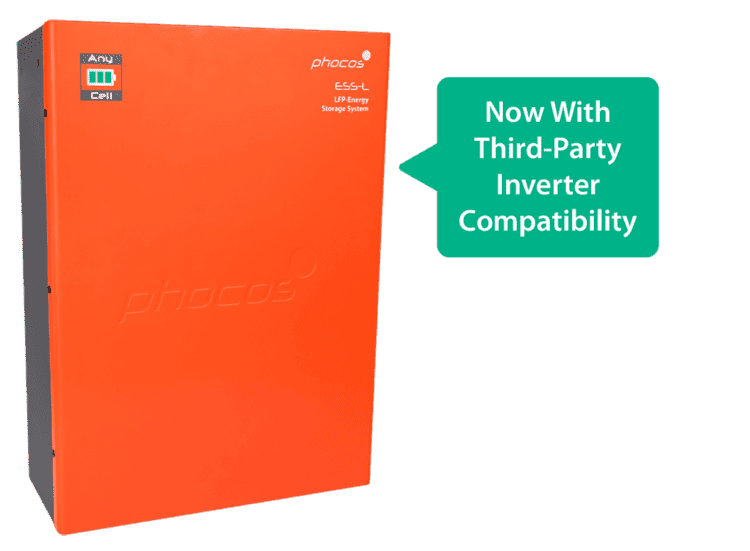
LFP-储能系统系列
伏科Any-CellTM储能系统LFP系列(ESS-L)是结构紧凑、模块化的磷酸铁锂解决方案,可提供安全、环保、长周期的存储系统。通过集成高级电池管理系统(BMS), Any-Cell ESS-L可与其它伏科产品无缝集成。与其它传统存储设备相比,磷酸铁锂(LiFePO4)技术对环境友好,使用寿命更长,无需维护,放电和充电效率全面提高。当与伏科Any-Grid逆变器相结合时,这些重要优点使Any-Cell ESS-L系列产品成为提供系统寿命期内最低总成本的关键。
与伏科Any-GridTM逆变器系列的兼容性使Any-Cell储能系统非常适合于一个完整的模块化电源解决方案,该解决方案可满足广泛的应用和电源需求。通过Any-Cell模块化,系统设计和安装都可以定制,以便在电源需求随时间变化时能轻松扩展系统。当与伏科Any-BridgeTM AB-PLC监控网关配合使用时,Any-Cell ESS-L与PhocosLink云门户无缝集成,可从世界任何地方进行远程实时系统监控。
Any-Cell都可以通过集成手柄快速方便地安装储能装置,以支持壁挂式和机架式安装。Any-Cell的设计和测试符合严格的国际安全和可靠性标准,由一家成熟的、行业领先的伏科供应商提供标准的10年保修。Any-Cell ESS-L系列产品是伏科的最新创新产品,补充了现有的产品组合,旨在随时随地提供灵活的能源接入解决方案。
-
产品特征
- 与特定的第三方逆变器兼容*
- 与伏科Any-Grid产品组合无缝集成
- 安全、免维护、LiFePO4/LFP磷酸铁锂材质
- 先进的电池管理系统
- 紧凑、高效的外形尺寸
- 模块化、可扩展,最多可并联8节电池
- 壁挂式或机架式安装
- 高效率和低阻力
- 高充放电比率
- 超过6000次循环@90% DoD
*仅美国亚利桑那州图森市和德国布贝斯海姆市有货。请与我们的销售团队联系以获取更多信息。
-
声明和认证
-
逆变器兼容性
Any-Cell ESS-L通过Any-Bridge AB-PLC-CAN与Any-Grid PSW-H混合逆变器无缝集成。
Any-Cell ESS-L还与下列第三方逆变器兼容*:
- Solis
- Victron
- GoodWe
- SMA
- SUN
- Deye/SunSynk
- AISWEI
*仅美国亚利桑那州图森市和德国布贝斯海姆市有货。请与我们的销售团队联系以获取更多信息。
常见问题
- 磷酸铁锂(LiFePO4)电池值得投资吗?
值得,采用磷酸铁锂电池技术的储能系统可在电池的循环寿命内为用户带来投资回报。虽然与铅酸等其他电池技术相比,其前期成本可能较高,但是使用寿命更长,放电深度更高,因此值得投资。例如,一个通过可再生方式充电的5kWh电池,放电6000次到90%放电深度,可提供 27MWh的存储能量
- 为什么磷酸铁锂电池优于市场上的其他储能选项?
传统的铅酸蓄电池需要定期维护,且只能放电至其容量的约50%,其使用寿命通常比磷酸铁锂电池更短。磷酸铁锂储能系统内置的电池管理系统能够保护电池,无需任何维护,部分电池可以放电至其容量的90%,以获得更大的利用率。选择磷酸铁锂电池,可实现高效率、高能量密度、长寿命、高放电深度,无需维护以及高充电速率。和其他锂化学物质相比,磷酸铁锂更加安全,因为它的可燃性低得多,而且热失控起始温度更高。
- 磷酸铁锂储能解决方案的预期寿命是多长?
大多数磷酸铁锂电池的可以使用5-10年,仍在制造商的保修期内。使用得当且存放在适宜环境中的磷酸铁锂电池可以使用10年以上。
- 为什么磷酸铁锂储能非常适合太阳能应用?
磷酸铁锂储能系统是住宅和商业储能中最安全的化学物质,具有较高的循环寿命,因此是基于电池的光伏系统的理想选择。这类光伏系统每天都要经历SOC循环,偶尔在没有阳光时会自主运行一段时间。
- 磷酸铁锂电池解决方案对家庭或小型企业有什么好处?
磷酸铁锂储能可减少或消除家庭和企业主对公共电力的依赖,或者在停电时提供令人安心的备用电力系统,从而提供长期的投资回报。
- 什么是磷酸铁锂储能?
磷酸铁锂是用于构建储能系统(ESS)的多种锂电池化学品之一。磷酸铁锂储能电池包括手机或手持设备中的便携式电池,和为家庭、房车、企业或微型电网供电的固定式电池组。
- 什么是磷酸铁锂(LiFePO4)?
磷酸铁锂是一种用于储能系统的特殊锂电池化学物质,LiFePO4是磷酸铁锂的化学式。
- 锂储能放电深度的最佳实践指南是什么?
将放电深度设置得低于制造商规定的最大绝对值,电池的使用寿命会更长。如果希望延长电池的使用寿命,使其远远超出制造商的保修期,则要执行高于日常需要的储能容量,降低日常的放电深度要求。
- 什么是放电深度(DOD)?
放电深度是您允许储能系统在一个循环内从完全充电状态放电的容量百分比。例如,75%的放电深度是指电池可以放电至其总容量的25%。放电深度=100–充电结束时的电池荷电状态。
- 磷酸铁锂电池会随着时间衰减吗?
所有电池,无论哪种电池类型或化学性质,都会随着时间而衰减。过高或过低的温度或电压、过高的充放电速率会使电池加速衰减(衡量标准是电池的健康状况,即原始容量与当前可用容量的比率)。相反,保守的电压电流限制、适中的环境温度有助于延长所有电池单元的寿命。
- LFP指的是什么?
LFP是指磷酸铁锂,其化学式为LiFePO4。磷酸铁锂电池是一种特殊的无钴锂离子电池,使用磷酸铁锂作为正极材料。